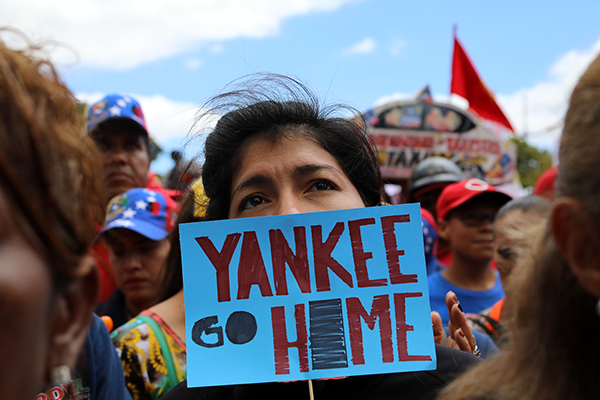by Tim Young
2019 has been a particularly testing year for Venezuela as President Nicolas Maduro’s government has fought off two coup attempts and is now subject to an extensive US-imposed economic blockade of the type employed against Cuba since the early 1960s.
In pursuit of its strategy of “regime change” against the elected Venezuelan government, the US under Trump backed an attempted coup in January this year.
Juan Guaido, from the extreme right-wing party “Popular Will” declared himself president but his call for Maduro to be toppled by a popular uprising came to nothing. A second coup attempt in April by Guaido similarly failed, with the armed forces staying loyal and “Chavistas” mobilising on the streets.
Guaido is currently facing a number of criminal investigations for embezzlement, treason and most recently for his connections with Colombian paramilitary groups.
Since the failure of these two attempted coups, US sanctions have been intensified, while US threats of military action against the Venezuelan government are still on the table.
Amongst other aggressive measures, the blockade involves an oil embargo, the international blocking of bank accounts and the obstruction of financial transactions outside Venezuela. Combined, they have severely affected the country’s capacity to import food, medicines or anything else.
The US sanctions are illegal under the charter of the Organisation of American States and under international human rights law, as well as treaties signed by the US.
Moreover, the UN’s special rapporteur on coercive measures’ impact on human rights, has stated: “The use of sanctions by outside powers to overthrow an elected government is in violation of all norms of international law.”
As a predominantly oil-based economy, Venezuela is inherently vulnerable to the effects of a blockade. Oil revenues provide the Venezuelan government with the foreign exchange needed to import essential goods: food, medical equipment, spare parts and the equipment needed for electricity generation, water systems and transport.
The sanctions cut deeply into these export earnings and reduce the government’s ability to import these essential goods. They also constrain the Venezuelan government’s ability to operate freely in the global market.
The lack of resources to maintain oil output through maintenance and new investment have led to production plummeting, with earnings falling still further.
Between August 2017 and December 2018, estimated losses to the Venezuelan economy are $23 billion, while assets frozen in the US are valued at $30 billion.
A report by the Washington-based Center for Economic Policy estimates that the sanctions have inflicted more than 40,000 deaths from 2017-18. Food and medicine imports continue to be delayed, disrupted and cancelled.
Swingeing new US sanctions on Venezuela levied in 2019 will reduce its foreign exchange earnings still further. Imports of goods are projected to fall by 39.4 per cent, from $10 billion to $6.1 billion. The economy is projected to contract by 37 per cent by the end of 2019.
Despite the blockade’s condemnation by the 120-strong Non-Aligned Movement and the Sao Paulo Forum in July, the US issued Executive Order 13884 on August 5 creating a total blockade of Venezuela.
It freezes all Venezuelan assets in the US and empowers the US Treasury Department to issue secondary sanctions against non-US third parties doing any type of business with the Venezuelan government, not just in the oil, banking and mining sectors.
Britain is also complicit in the sanctions regime, through its support for EU measures unanimously agreed in November 2017.
In addition, the Bank of England, although nominally independent of the government, is still stopping 31 tonnes of Venezuelan gold deposited in its vaults, worth almost £1 billion, from being repatriated to its rightful owners, the Venezuelan government.
The blockade will not help Venezuela’s people at all but simply exacerbate the country’s problems and divisions. Sanctions will not help to facilitate a national dialogue to resolve Venezuela’s issues.
But Maduro’s willingness to continue to seek dialogue has seen a measure of success. Key points of agreement with several more moderate opposition party leaders were announced in September, including a call for US sanctions to be lifted.
With Bolivia, a former key ally of Venezuela, now under right-wing control following the recent coup, the need for international solidarity with the Venezuela is even more vital.
Join the Venezuela Solidarity Campaign at www.venezuelasolidarity.co.uk/join.

